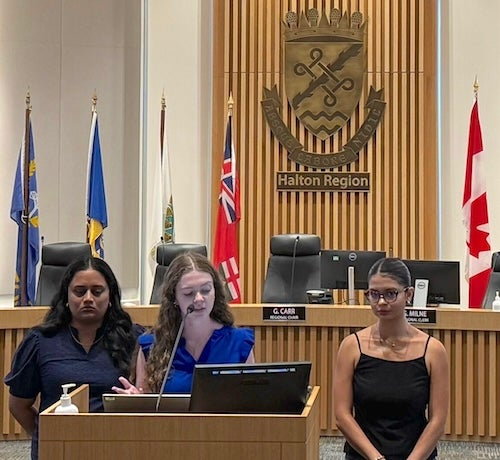An eclectic mix of 30 students joined forces at the University of Waterloo to participate in this year's Sustainability and Social Entrepreneurship Fellowship (SSEF) program, hosted by the Pearl Sullivan Engineering Ideas Clinic and developed in partnership with Halton Region.
The annual, nine-week program challenges students from Waterloo and abroad to explore ideas for improved urban development and present innovative solutions that address the impact of climate change and mitigate further environmental damage.
Waterloo Engineering alum Andrew Farr (BASc '97), chief administrative officer at Halton Region and the University's Douglas Wright Engineer in Residence a position funded through Waterloo's Turkstra Chair in Urban Engineering, helped shape this year's theme: Sustainability in the built environment.
Farr kicked the 2025 program off, briefing the students on Halton's services, infrastructure and development goals namely to achieve net-zero carbon emissions by 2045. Halton serves more than 650,000 residents and is one of the fastest growing communities in Canada. As the Region balances rapid growth with a commitment to environmental sustainability, it faces unique challenges in building sustainable infrastructure, protecting natural assets and meeting the needs of its diverse and expanding population.
Tasked to help the Region realize its goals, the 12 student teams immersed themselves in an action-packed itinerary of field trips, concept-mapping, ideation, stakeholder consultations and strategy sessions. Through the IDEAs Clinic, students received the mentorship and freedom to move beyond lectures and textbooks and tackle the complex issues with fresh thinking and hands-on action.
It was hard work and very rewarding at the end of the nine-week program they presented 12 deeply researched and data-driven projects with real-world relevance to the Halton Region staff. The proposed solutions included innovative designs for rain gardens and permeable paving to mitigate flooding in community housing, updated transit infrastructure to reduce emissions and improve ridership, and a retrofitted wastewater sludge system to reduce greenhouse gas emissions and operating costs.
"Partnering with the University of Waterloo through the Sustainability and Social Entrepreneurship Fellowship has been an inspiring experience for Halton Region," said Farr. "The students brought creativity, energy and practical solutions to some of the most pressing challenges we face as a rapidly growing community. Their ideas from climate adaptation strategies to innovative infrastructure designs reinforce the importance of collaboration in building a sustainable future for our residents."
With funding support from Lark Scientific, a self-funded, non-profit company committed to educating and empowering Canadians on climate change issues, the SSEF program welcomed its 2025 cohort of Sustainable and Social Entrepreneurship fellows from Conestoga College (Canada), Harvey Mudd College (USA), Khalifa University (U.A.E), Tecnológico de Monterrey (Mexico) and the University of Waterloo (Canada). This year, the fellows were joined by WE Accelerate students from Waterloo's faculties of Engineering and Environment who gained valuable co-op work experience.
"At Lark Scientific, we believe progress comes from pairing innovation with sustainability," says Axel Doerwald, founder and executive director of Lark Scientific. "Supporting the Fellowship has been rewarding, as it empowers students to transform ideas into practical solutions. Mentoring this year's fellows has been inspiring. I'm pleased that Lark's sponsorship and mentorship can play a role in equipping our next generation of leaders to drive meaningful change."
For Rebecca Robinson, a third-year engineering and economics student at Harvey Mudd College, it was her first time leaving the United States. Keen to apply her degree more broadly, she jumped at the chance to gain international experience and challenge her academic skills.

Rebecca Robinson at the podium flanked by teammates Abani Jeevaharan and Alba Cristina Macedo Sánchez.
"I got everything I came for and more," says Robinson. "Working with people from other countries and academic disciplines is incredibly valuable, it made our projects better and taught me new ways to problem-solve, collaborate and communicate. I'd never written or presented a policy brief before and learned how to bring technical ideas to life more effectively. I feel more empowered to do work that drives meaningful change. And best of all, I've made great new friends."
Get in touch with Dr. Chris Rennick the engineering educational developer at the Pearl Sullivan Engineering IDEAs Clinic at the University of Waterloo, to find out how you can support and participate in the Sustainability and Social Entrepreneurship Fellowship program.













